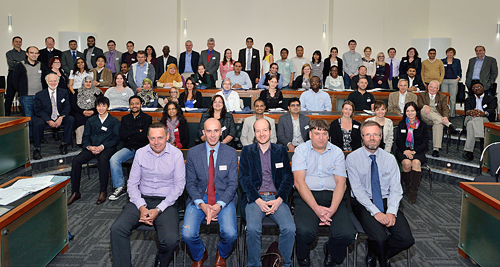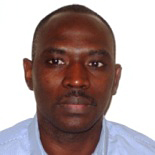Huddersfield runs the UK’s first Hydrocolloids Symposium
Fri, 20 Sep 2013 12:09:00 BST
Symposium success for the University’s Carbohydrate Research Group

Pictured: Among the delegates at the 1st UK Hydrocolloids Symposium are organisers Dr Alan Smith, Senior Lecturer in Pharmacy and Pharmaceutical Sciences [front row, far left], Dr Vassilis Kontogiorgos, Lecturer in Biology and Nutrition [front row, second left] and Dr Gordon Morris, Lecturer in Chemical and Biological Sciences [front row, far right].
HUGE numbers of modern foodstuffs and medicines contain hydrocolloids. These are polymers which are obtained naturally – such as gums from certain plants – or produced synthetically. They can be used to bind, thicken or stabilise and have enormous potential. But scientists working in the different fields of hydrocolloid research rarely encountered each other – until a conference at the University of Huddersfield set out to cross the boundaries.
The 1st UK Hydrocolloids Symposium has successfully taken place at the University. It attracted some 75 researchers from Britain and overseas. It was organised by three Huddersfield scientists and lecturers who usually operate in different areas of chemistry, but incorporate hydrocolloids in their work.
They are Dr Alan Smith, who specialises in pharmaceutics; Dr Vassilis Kontogiorgos, a food scientist; and Dr Gordon Morris, an analytical chemist. As members of the Carbohydrate Research Group based at the University of Huddersfield, they are used to cross-disciplinary working. So they decided to devise a symposium that would reflect this.
“Other conferences tend to be more focused on either food or pharmacy. But hydrocolloids are not just used in those fields,” said Dr Smith. “For example, they also have bio-medical applications, in areas such as tissue engineering. They are very diverse materials and they are finding increasingly diverse uses.”
The one-day symposium attracted speakers from 11 UK universities and research institutes, who delivered papers and presentations on many aspects of hydrocolloids. There were also papers from scientists based at universities in Greece, Russia and Japan. The event also featured a display of 31 posters describing hydrocolloid research projects in detail.
 One of the speakers was the Nigerian scientist Dr Elijah Nepp (pictured), who is the University of Huddersfield’s first Newton Fellow, the recipient of a coveted award from the Royal Society.
One of the speakers was the Nigerian scientist Dr Elijah Nepp (pictured), who is the University of Huddersfield’s first Newton Fellow, the recipient of a coveted award from the Royal Society.
Working with Dr Smith, he is investigating the medicinal potential of grewia gum, a natural hydrocolloid that is abundant in Nigeria. The project also draws on the expertise of Dr Morris and Dr Kontogiorgos.
The symposium was funded by the University of Huddersfield’s Intellectual Climate Fund and also received sponsorship from Stable Micro Systems Ltd, Malvern Instruments Ltd, NanoSight Ltd, Wyatt Technology Corporation and confectionery giant Nestlé.
The success of the first 1st UK Hydrocolloids Symposium means that the event is likely to be repeated, and the Huddersfield organisers have held discussions with colleagues at other institutions who could take the baton. Also, Dr Kontogiorgos, Dr Smith and Dr Morris have been invited to edit a special issue of the journal Food Hydrocolloids. All the researchers who contributed to the symposium will be invited to submit papers.







